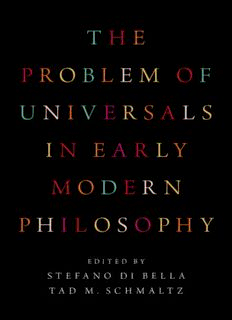
The problem of universals in early modern philosophy PDF
Preview The problem of universals in early modern philosophy
THE PROBLEM OF UNIVERSALS IN EARLY MODERN PHILOSOPHY THE PROBLEM OF UNIVERSALS IN EARLY MODERN PHILOSOPHY Edited by Stefano Di Bella and Tad M. Schmaltz 1 1 Oxford University Press is a department of the University of Oxford. It furthers the University’s objective of excellence in research, scholarship, and education by publishing worldwide. Oxford is a registered trade mark of Oxford University Press in the UK and certain other countries. Published in the United States of America by Oxford University Press 198 Madison Avenue, New York, NY 10016, United States of America. © Oxford University Press 2017 All rights reserved. No part of this publication may be reproduced, stored in a retrieval system, or transmitted, in any form or by any means, without the prior permission in writing of Oxford University Press, or as expressly permitted by law, by license, or under terms agreed with the appropriate reproduction rights organization. Inquiries concerning reproduction outside the scope of the above should be sent to the Rights Department, Oxford University Press, at the address above. You must not circulate this work in any other form and you must impose this same condition on any acquirer. CIP data is on file at the Library of Congress ISBN 978– 0– 19– 060804– 0 9 8 7 6 5 4 3 2 1 Printed by Sheridan Books, Inc., United States of America CONTENTS Acknowledgments vii List of Contributors ix 1. Introduction to Universals in Modern Philosophy— Stefano Di Bella and Tad M. Schmaltz 1 2. Gassendi on the Problem of Universals—Antonia LoLordo 13 3. Hobbes, Universal Names, and Nominalism—Stewart Duncan 41 4. Spinoza on Universals—Samuel Newlands 62 5. Descartes on Universal Essences and Divine Knowledge—Lawrence Nolan 87 6. Platonism and Conceptualism among the Cartesians—Tad M. Schmaltz 117 7. Universals and Individuals in Malebranche’s Philosophy—Mariangela Priarolo 142 8. Universals in English Platonism: More, Cudworth, Norris—Brunello Lotti 166 9. Some Perspectives on Leibniz’s Nominalism and Its Sources—Stefano Di Bella 198 10. Locke’s Essay and Leibniz’s Nouveaux Essais: Competing Theories of Universals—Martha Brandt Bolton 220 11. Locke on General Ideas—E. J. Lowe 252 vi • Contents 12. Berkeley on Abstraction, Universals, and Universal Knowledge—Tom Stoneham 267 13. Hume on Abstraction and Identity—Donald L. M. Baxter 285 14. Kant and Abstractionism about Concept Formation—Alberto Vanzo 305 Works Cited 325 Index 345 ACKNOWLEDGMENTS Several chapters in this volume were first presented at a workshop on the problem of universals in early modern philosophy, held at the Scuola Normale Superiore in Pisa, Italy, in November 2011. This workshop was part of a cycle of conferences on the topic of universals, the central aim of which was to combine a historical treatment of different periods of this problem (ancient, medieval, and modern) with a consideration of theoretical perspectives drawn from the contemporary philosophical debate. The idea of this ambitious project came from Francesco Del Punta, a historian of medieval philosophy, who provoked us to explore the continuities and transformations of treatments of this topic in modern philoso- phy, outside the limits of the medieval philosophical agenda with which it is usu- ally associated. While working on this volume, we lost Francesco and another friend and colleague, Jonathan Lowe, who also contributed to the general project from its very beginning and who is the author of a chapter of the present volume. We dedicate this volume to the memory of Francesco and Jonathan. LIST OF CONTRIBUTORS Donald L. M. Baxter is Professor and Department Head in the Department of Philosophy at the University of Connecticut. He specializes in Metaphysics and Early Modern (Western) Philosophy. He authored Hume’s Difficulty: Time and Identity in the “Treatise” (Routledge, 2008) and coedited (with A. J. Cotnoir) Composition as Identity (Oxford University Press, 2014). Stefano Di Bella is Professor of History of Philosophy at the University of Milan, Italy. His research interests are focused on the history of philosophy, especially early modern, and metaphysics. He is the author of numerous articles in early modern philosophy, and of the volumes Le “Meditazioni metafisiche” di Descartes: Introduzione alla lettura (1997) and The Science of Individual: Leibniz’s Ontology of Individual Substance (2005). Martha Brandt Bolton is a Professor of Philosophy at Rutgers University. She works on the history of seventeenth- and eighteenth- century philosophy and is currently interested in theories of cognition and their metaphysical implications. Stewart Duncan is Associate Professor of Philosophy at the University of Florida. He is the author of several articles on Hobbes, Leibniz, and other seventeenth- century philosophers. Antonia LoLordo is Professor of Philosophy at the University of Virginia. She is the author of Pierre Gassendi and the Birth of Early Modern Philosophy and Locke’s Moral Man, as well as papers on Descartes, Edwards, Gassendi, Locke, Malebranche, Shepherd, and other early modern philosophers. Brunello Lotti is Associate Professor of History of Philosophy at the University of Udine, Italy. He is author of Ralph Cudworth e l’idea di natura plastica (Udine, 2004) and of L’iperbole del dubbio. Lo scetticismo cartesiano nella filosofia inglese tra Sei e Settecento (Florence, 2010). E. J. Lowe (1950– 2014) studied in Cambridge and Oxford and taught for many years at the University of Durham. He was an original and influential philosopher. His most important contributions were to philosophy of mind, philosophical
Description: